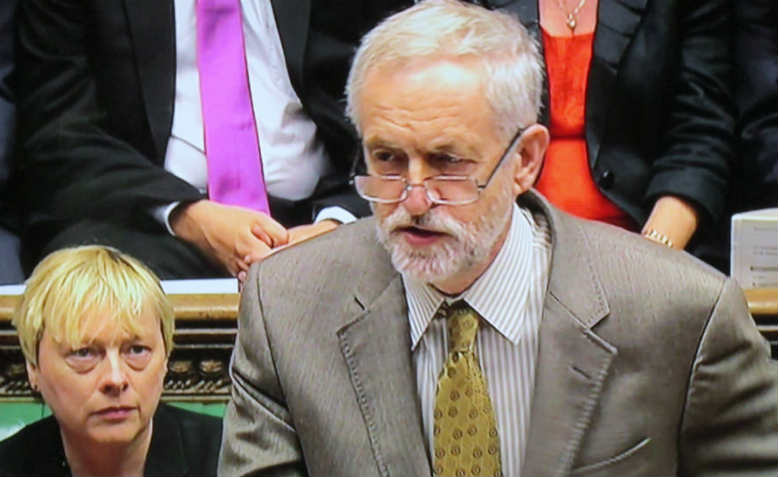 Jeremy Corbyn during PMQs. Photo: Flickr/ David Holt
Jeremy Corbyn during PMQs. Photo: Flickr/ David Holt
Lindsey German looks at what happens next after Jeremy Corbyn’s landslide victory in the second Labour Leadership election in 12 months
The remarkable second victory for Jeremy Corbyn is making waves. But deep in the heart of the Parliamentary Labour Party it isn’t changing many minds. Nor is it in the mainstream media, which is generally acting with exasperation and disdain at the fact that the pesky membership has once again voted – this time by an even bigger margin – to elect the most left wing leader in Labour’s history.
The word in public on most people’s lips is unity: that the party has to unite to face down the common enemy of the Tories and to win a general election, which (as Corbyn has pointed out) may be only 6 months away. Unity is always seen as a good thing, for good reasons. The left’s reputation for division (although it could easily take some lessons from the right in the Labour Party) has often put off good socialists from being involved in politics.
But unity cannot be at any price. It has to be based on a set of agreed principled polices, in which there is room to debate and disagree but also where there is not the kindof undermining of those policies that has often been seen on the part of some MPs.
There are also two internal questions which cannot be ignored. One is the behaviour of the majority of the PLP over the coup and the staged shadow cabinet resignations. There should, at the very least, be no accommodation with the kind of grandstanding where the defeated MPs (and their candidate has been badly defeated) are now demanding that they elect the shadow cabinet – a recipe for permanent war against Jeremy Corbyn. This is its intention, by the way, not a by-product of it.
The second issue that cannot be ignored is the suspension and expulsion of so many members and supporters, and the denial of the vote to so many. There are numerous examples of prima facie injustice which must be redressed, and the apparatus should be challenged about these.
These are some steps which could unite the party, where it should be made clear to MPs that they are public servants, not people aloof from democratic accountability. And they are accountable to their members, not just the electorate as they now ludicrously claim.
Everyone knows in a first past the post system the political skill in many seats is not getting elected but getting selected for one of the two main parties. The truth is any Tory in Surrey or any Labour candidate in much of Yorkshire will win regardless of their merits or otherwise. Humility on this issue is in order.
Labour is now the biggest party by far in Britain, bigger than all the others put together. Corbyn has a massive mandate. The prospect of Labour becoming even larger surely helps change the electoral landscape because it will have hundreds of thousands of activists and supporters who will campaign.
So what next?
1Unity for Labour is important but it has to be a unity of principle and action. It has to fight for the policies Corbyn puts forward – against austerity, for genuinely comprehensive education, an end to horrors at work such as zero hours contracts, for a genuinely ethical and non-imperial foreign policy. It has to mobilise supporters on a range of issues from grammar schools to Sports Direct to put an alternative to big business and the Tories.
2Campaigning in elections is central to a party like Labour and has to be taken seriously. Activists should be involved in canvassing, leafletting, door knocking and all the things which help get out the vote. But as important are the events outside elections which begin to shift consciousness among working people – demonstrations, picket lines, protests, meetings and rallies. Corbyn came from the movements and it is these which will help sustain him and his allies.
3There is no need to retreat on long-held policies. If a policy is right it should be fought for, not abandoned when it appears unpopular. Consciousness changes, as we have seen over a range of issues from LGBT rights to racism. The job of socialists is to fight for their ideas inside the working class movement.
4Rosa Luxemburg said ‘in the beginning was the deed’. In other words real events change history. Jeremy Corbyn very importantly called for a day of action against grammar schools next Saturday. That weekend the Peoples Assembly along with the West Midlands TUC is taking the fight to the Tories in Birmingham. Labour members and supporters should be on the demo demanding an end to Tory policies.
5There are a small number of significant strikes, despite the serious mistake of the junior doctors leadership in abandoning their strikes. There are also the campaigns against fire service attacks in Manchester, the teaching assistants in Derby and Durham and many more. All Corbyn supporters should should raise money, publicise their demands and fight for solidarity.
6The country is bitterly divided post Brexit, and the Tories are trying to impose immigration controls which will be harsher than those we already have. Corbyn has a chance to lead the call for a left Brexit – against racism and limits to immigration, for the rights of all EU citizens to stay here, for defence of workers rights, for an end to TTIP and other neoliberal trade agreements, for investment in housing, transport and industries that benefit working people. This would undercut the Labour right who are calling for more immigration controls. It would also undercut UKIP by presenting an alternative to racism.

